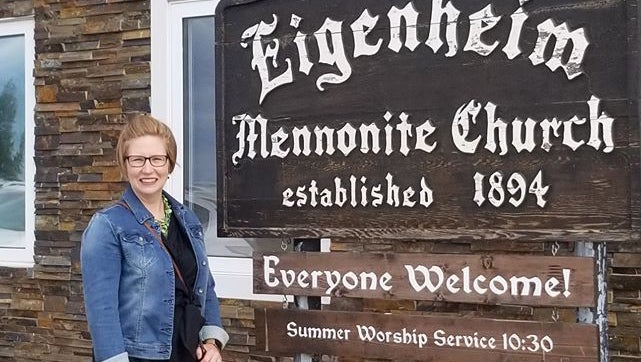Master of Theological Studies Equips Graduates for Work in Mennonite Churches
The Master of Theological Studies (MTS) program at Conrad Grebel University College in Waterloo draws together students from various backgrounds to study the Bible, Christian theology, church history, and the practice of ministry. Recent MTS graduate Rachel Wallace recalled that the interactions she had with this diverse peer group were a vital part of her learning experience. While students may come from a variety of Christian traditions, during their time at Grebel, many have been drawn to Mennonite beliefs and culture. Some, like Rachel, even go on to become pastors in Mennonite churches.

Rachel graduated from Grebel’s MTS program in April 2019. She grew up in the Baptist Church but now works as a pastor at Eigennheim Mennonite Church in Saskatchewan. “Pastoring is rewarding in so many ways. It is an incredible privilege to be invited into people’s lives and bear witness to the ways they are struggling or celebrating,” reflected Rachel. She noticed that her experience in the MTS program gave her the tools she needed for ministry. “Each week I find myself drawing directly from things taught in my courses at Grebel.”
While she did not come to the program with Mennonite roots, as Rachel learned about Anabaptist and Mennonite history at Grebel, she found that the Mennonite Church and community resonated with her. “I discovered that they lined up well with my own theology and that I appreciated the ways Mennonites do church and life together.” After completing her degree, she found her faith now fit best within the Mennonite Church context.
This is not an inherently unique experience to find within the MTS program at Grebel. Professor Carol Penner, who teaches in the area of practical theology, noted that she has seen many instances of students from different denominations finding themselves working with Mennonite churches after graduation. “Students often resonate with issues of peace, social justice, the community nature of the Mennonite Churches and its emphasis on Biblical teaching,” she added. “Sometimes people come here not knowing anything about Mennonites. As they learn more, they may realize we aren’t as different as they thought. We become more accessible and they begin to think they might even fit into this denomination.”
Carol emphasizes that students aren’t always looking for a paid position in the church. She mentioned that “service looks different for each person.” However, MTS students become “theologically articulate and aware” which helps them impact their community in whatever nature of ministry they find themselves. Carol explained that they are equipping students for ministry as they grow into and confirm what this calling may be.
“We are grateful for the role Grebel plays in developing and training pastors for the Mennonite Church,” noted Marilyn Rudy-Froese, Church Leadership Minister at Mennonite Church Eastern Canada (MCEC). “Grebel is a valued partner in working to meet the pastoral needs of MCEC congregations.”

2018 graduate Zach Charbonneau has also found a place in the Mennonite Church after completing an MTS degree. He too entered the program without previous Mennonite background. Zach has been working as Pastor of Youth and Outreach at Leamington United Mennonite Church since September 2018. However, pastoral ministry was not always the plan. “I did not think I was going to be a pastor. I planned on rolling MTS into a step toward psychotherapy.” Yet, conversations with professors and members of the community drew him to pastoral ministry. “Robert Suderman and Allan Rudy Froese talked about the call of the church in the world. This reinvigorated my hope for the church.”
Zach said his time at Grebel was a positive experience due in part to the diversity of theological thought he was introduced to. “The MTS program definitely helped me to grow as a theological thinker and helped me to develop as a teacher of the Bible.” Zach also discovered that “the spectrum of theological thought we were exposed to in the program meant that I walked away with a much broader lens through which to see Christianity.” He appreciated the variety of theological backgrounds the different MTS students brought to the community.
“I think there is a Mennonite ethos here that is very hospitable to a wide range of perspectives,” said Professor Jeremy Bergen, who is also Director of the MTS Program. “Some students come from Pentecostal, Reformed, or Catholic traditions, and then serve those communities. Small class settings and conversations over lunch allows us to build bridges in many directions. Together we discover ways to engage deeply with the Bible and with theology for the sake of ministry in a rapidly changing church landscape.”
by Elizabeth Robertson